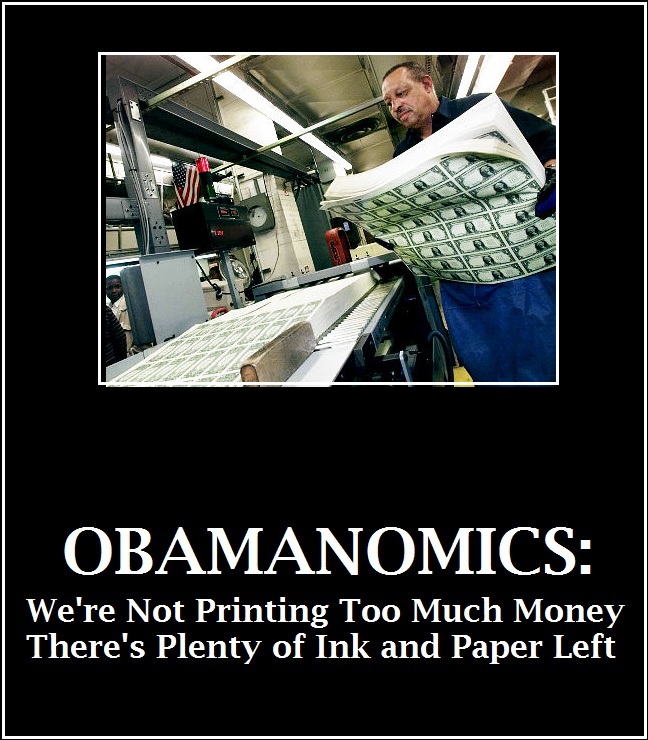Sent to you by Jay via Google Reader:
via YID With LID by Jeff Dunetz on 11/3/10
Its called quantitative easing, which is just banker talk for devaluing the a currency. Today the Fed is about to work some "black magic." They are going to create $600 billion dollars out of nothing. It absolutely no different than a corporation vowing to improve its fiscal performance simply by printing a lot of new shares.
This is how it works:
Usually, central banks try to raise the amount of lending and activity in the economy indirectly, by cutting interest rates. Lower interest rates encourage people to spend, not save. But when interest rates can go no lower, a central bank's only option is to pump money into the economy directly. That is quantitative easing (QE). The way the central bank does this is by buying assets - usually financial assets such as government and corporate bonds - using money it has simply created out of thin air. The institutions selling those assets (either commercial banks or other financial businesses such as insurance companies) will then have "new" money in their accounts, which then boosts the money supply.For all intents and purposes that $600 billion is being borrowed. As the government's banker, the Fed can borrow money, and pay it back when it chooses to, by selling off the bonds that it will be purchasing. The effect of this kind of action is the same as if Congress was appropriating another "porkulus" it dumps cash into the economy by increasing our federal debt. This move is essentially ignoring the message the voters sent to the government yesterday, even worse, it is economic suicide.
Here's the problem, by "printing" all of this extra cash our government is trying to create inflation and "spur the economy" with this move there is a real chance of creating hyperinflation. That's exactly what Germany did in the late 1920's.
The famous Economist, John Maynard Keynes described this situation in The Economic Consequences of the Peace: "The inflationism of the currency systems of Europe has proceeded to extraordinary lengths. The various belligerent Governments, unable, or too timid or too short-sighted to secure from loans or taxes the resources they required, have printed notes for the balance.
And now our Keynesian President, is allowing the Fed to go against Keynes' advice.
That's not the only risk:In normal times, a Fed spending spree on government bonds would be highly inflationary, because it would flood the economy with money and raise worries about too much government spending. The mere worry of too much inflation in financial markets could drive long-term interest rates higher and cause the Fed's program to backfire.
Michael Pence, a top Republican in the House of Representatives, said the Fed was taking an "incalculable risk."
Thomas Hoenig, the president of the Federal Reserve Bank of Kansas City, who described the move before the meeting as a "bargain with the devil," was the lone dissenter in a 10-1 vote of the Fed's policy committee. He said the risks of additional government bond purchases outweighed the benefits.
Critics say a weaker dollar isn't in U.S. interests, and that a swift decline in the value of the currency could drive up U.S. interest rates. Fed officials have seen the dollar's drop to date as being orderly and supportive of growth.Fed Chairman Ben Bernanke, in an opinion piece posted on the Washington Post's web site on Wednesday, said policymakers could not sit idly by given the anemic economic backdrop. He argued that fears that unconventional monetary policy would spark a future bout of inflation were "overstated."
Some critics also argue that by purchasing government bonds, the Fed is taking pressure off the White House and Congress to address long-term deficit problems, but Mr. Bernanke is trying to avoid such political calculations.
U.S. trading partners, particularly in the developing world, openly worry that the Fed's money pumping is creating inflation in their own economies and a risk of asset-price bubbles. Fed officials say a strong U.S. economy is in everyone's interest.
"Inflation that is too low can pose risks to the economy -- especially when the economy is struggling. In the most extreme case, very low inflation can morph into deflation, which can contribute to long periods of economic stagnation," Bernanke wrote.At best, the Fed's announced action is a crap-shoot, it may turn around the economy as Bernanke believes, or it may send the economy into an uncontrollable inflationary spin as it did in the German Weimar Republic of the 1920's. This is not a risk that should be taken lightly and certainly one that should be taken without the advice and consent of the US Congress.
Please email me at yidwithlid@aol.com to be put onto my mailing list. Feel free to reproduce any article but please link back to http://yidwithlid.blogspot.com
Things you can do from here:
- Subscribe to YID With LID using Google Reader
- Get started using Google Reader to easily keep up with all your favorite sites

No comments:
Post a Comment